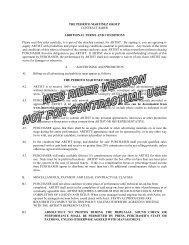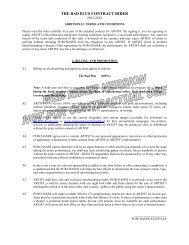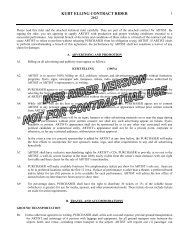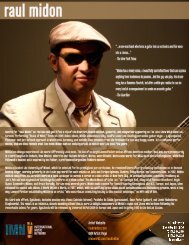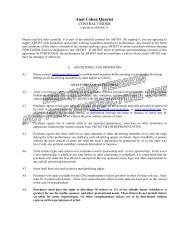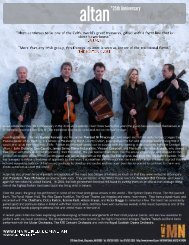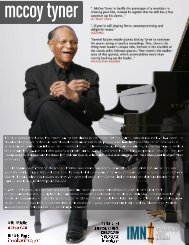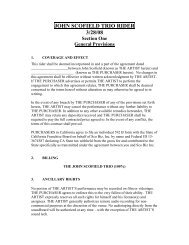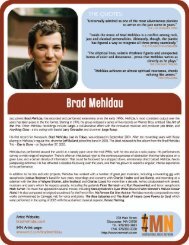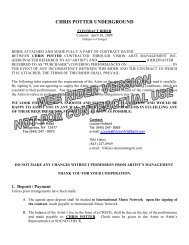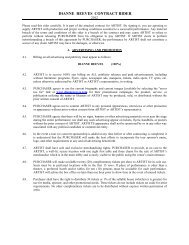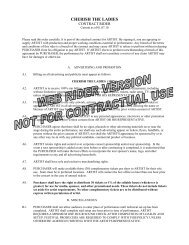Create successful ePaper yourself
Turn your PDF publications into a flip-book with our unique Google optimized e-Paper software.
Medeski <strong>Scofield</strong> Martin & Wood: In CaseThe World Changes Its Mind (2011)By JOHN KELMAN, Published: November 1, 2011With significant pressure on artists to look for new territory to mine and newcollaborations to explore, it's always great to see those that have workedwell kept as ongoing concerns, like guitarist <strong>John</strong> <strong>Scofield</strong>'s first-encounterwith jam band darlings Medeski, Martin & Wood on the superb A Go Go (Verve, 1998). The nownamedMedeski <strong>Scofield</strong> Martin & Wood still reconvenes occasionally, with its follow-up, OutLouder (Indirecto, 2006), a more free-wheeling alternative to its predecessor's focus on <strong>Scofield</strong>'sparticularly fine writing. Five years later, In Case The World Changes Its Mind strikes the perfectbalance between form and freedom.Recorded on tour in 2006, while some of the same songs also appear on the European double-discversion of Out Louder, they're different versions. If that bonus, EP-length live disc gave fans a taste ofMSMW in performance, then In Case The World Changes Its Mind is the real deal, its groove-laden,115-minute set of 11 tunes equitably split between MSMW's two studio discs, with an extended jamthrown in for good measure, along with a gospel-drenched version of"Amazing Grace."<strong>Scofield</strong> may be working his softer side lately on his relaxed A Moment'sPeace (EmArcy, 2011), but he's in incendiary form here, in particular on asearing version of "Miles Behind," where his wah-driven guitar goes head-toheadwith <strong>John</strong> Medeski's grittily overdriven electric piano, bolstered by anuclear groove from bassist Chris Wood and drummer Billy Martin thatseems always on the edge of a precipice—threatening to dissolve intocomplete anarchy at times, but always pulled back from the brink at the last possible moment.Medeski's piano also drives the greasier title track, though he mixes it up with a melodica in the frontline with <strong>Scofield</strong>, who's featured in an extended duo with the second line-informed Martin, theguitarist's complex voicings and angular phrases leading to some visceral slide playing. Both thesesongs from Out Louder are considerably expanded in length here; exemplifying one of MSMW's majorMOs: taking ideas stemming from jams and turning them into tunes.The material from A Go Go is given equal chance to expand, in particular the 11-minute set-closer,"Hottentot," where Medeski's swirling organ work is at its best, though his remarkable command overtone and texture—an analog fan's wet dream—is a cornerstones throughout. A Go Go's title track isequally compelling, while a medley of that album's "Deadzy" and Out Louder's "What Now" blendsidiosyncrasy with straightforward boogie to great effect.But the centerpiece of In Case The World Changes Its Mind is the 25-minute "Walter Hanuman,"starting with a sprawling N'awlins jam that takes its good time getting to the core of Out Louder's
eally well, big open-string chords and the blues. Everyone plays the blues, but you need the vibrato. Iremember there were certain guys that had a vibrato that just killed me when I was younger.Yeah, you always hear jazz guitarists try to emulate saxophonists.Or even blues vocals. It’s just the idiom. Saxophone was the primary solo instrument in early rock androll and R&B. A lot of it does come from the sax. A lot of it also comes from singing. You just sit therewith a string and bend the notes and if someone understands blues and can hear it a little bit, they canget some of that happening. You just need one string. It's been much maligned, there have been a lot offsad-ass blues guitar players but the greats like to me Albert King and B.B. King, the inventor of the idiom,Otis Rush, those are the guys I love and continue to just be in awe of them.For the most part, you have one guitar sound on the album. What guitar did you use?Well, I played the same old guitar I've always had. I keep buying new guitars but I never actually usethem. I play them in my basement. I use this 1981 Ibanez AS200. Basically, it’s their copy of a GibsonES-335. I have played that since they gave it to me in Nagoya, Japan when I was on tour in the earlyeighties.Have you modified it at all since then?Not on purpose. It came with this little switch that takes one of the pickups in and out of phase, and Ididn’t like it. I just wanted it to be a regular humbucker, so I filed that down. That was a modification, Iguess. The input was on the side of the guitar so I had it moved to the front of the guitar. The pickupsare still stock, I am scared to change them. There might be much better pickups in the world, but I likethese. They are loud as shit.Recently, you have been using Vox amps. Did you use them for this album?This time I used a Two-Rock amp. I went out to California and did a thing with Robben Ford. While I wasout there, I didn’t have my amp and at the rehearsal Robben had his pre-CBS Fender Super Reverb thatwas modified by Dumble. This amp was one of the greatest amps of all time! I was flipping out over thetone I was getting. Robben said, ―Listen, I will hook you up with Dumble and if you can get an oldFender, he can do the same thing for you.‖ It just turned out to be too expensive. I still want to havethat done but I am just waiting for my ship to come in. Robben then told me about the Two-Rock amps.I was in Europe and the Two-Rock company was nice enough to let me use one of their amps on a gigand I loved it. On the album, I used a Custom Reverb through a Two-Rock cabinet. Since then, I havegone back and put it through the Vox cab and I think I like that even more. There is something about thesound of that cabinet. I still use Vox AC30 on tour, when I don’t bring my own amp.You didn’t use too many effects on the album, but I heard some subtle tremolo on “I LovesYou Porgy.”It’s a Moollon Tremolo. I was in North Korea playing a gig and the guy showed up. I like it. It has such acool design.
Is “Johan” a tribute to the composer?Yes. It is. I wrote the piece and then afterwards, or maybe as I was writing it, I realized that there was areally famous Bach piece that I learned on the guitar 30 years ago. I learned part of it on the guitar,never learned the whole thing. I can’t remember the name of it. It’s like a Pavanne, or one of the dances.Segovia played it and it’s in E. I realized that the beginning of my song is really similar. It’s kind of avoicing I played, so I dedicated the piece to the master.Do you have any classical guitar aspirations?Maybe in my next life. That might be still the greatest thing you can do with the guitar, but it’s almostlike a different instrument.On “Plain Song,” I can almost hear elements of Bill Frisell.Frisell has copied me for years. I’m joking. I love Bill’s playing and he really influenced me when weplayed together in the ’80s. When I play that type of stuff, I don’t think of Bill. I am actually a fan of theold-school country western stuff. Country sounds are just inherent in the guitar. I also think of singers.There is a way you can articulate [plays riff] by pulling off on open strings that really has some of thatceltic vibe. George Jones is my favorite and all those guys like Merle Haggard, those real hillbillies.If you had to pick five ballad performances that have stuck with you over the years, whatwould they be?I have to first mention a disclaimer. These were the first five I could think of. It gets too weird if I reallythink about it. I’m going to only mention instrumentalists, because the truly great ballad performancescome from singers and there are just too many to list. Immediately, I think of Sarah Vaughan and FrankSinatra. Every singer, if they are worth their salt, can sing ballads because that is the human experience.The first one would be ―I Loves You Porgy‖ by Bill Evans from his album, Live at the Village Vanguard.It’s on my record, so I stole it from him.<strong>John</strong> Coltrane’s ―Naima‖ is just a beautiful song, period. Coltrane is so outstanding as an improviser andsaxophonist that we forget about his compositions.Jim Hall is the great ballad player of the guitar. His version of ―I Should Care,‖ which is on Where Would IBe is a solo guitar piece and it’s stunning to me.My own personal thing is playing ballads with Steve Swallow. The way he can play them on the bass hasbeen such an influence on me. He made a record with a big band from Sweden called Swallow Songs. It’sall Steve’s music and it opens with a tune called ―Away,‖ and his solo is a great example of how he canplay a ballad.I was thinking of something with a saxophone. Ben Webster is one of the greatest ever. His version of―Like Someone to Watch Over Me‖ from See You at The Fair is amazing.
Keith Jarrett. There’s a way to play fast, with a lot of notes, over a ballad and still keep it a ballad and hecan do that. The example that always struck me is on this very obscure record from early in Keith’scareer. It’s an album put out by Billy Martin, the drummer from Medeski, Martin and Wood, on his ownlabel. It’s an album by the drummer Bob Moses called Animal Love. There is a version of ―Smoke Gets inYour Eyes‖ and Keith is on that tune and his playing is just incredible. It’s a lesson for me about how youcan play a lot of notes on a ballad.I also wanted to mention Bill Frisell because I feel like he is one of the only people of our generation thatcan really do it and play beautifully. I couldn’t think of a specific example, but there’s a ton of them.A peaceful moment with a jazz icon: <strong>John</strong> <strong>Scofield</strong> tells it all<strong>John</strong> <strong>Scofield</strong> chats about his newest album, jazz maturity, passing the torchand what it was like to play with the great Miles Davis.By Matthew Flores Published Nov. 4, 2011<strong>John</strong> <strong>Scofield</strong> is a man at peace. After nearly 40 years and enough records tostuff Dizzy Gillespie’s cheeks, the man known as "Sco" has released an albumthat perfectly exemplifies his skills as a guitar player: cool, confident and fullof the experience that only comes after decades writing and recording music.A Moment’s Peace is not stereotypical <strong>Scofield</strong>. Gone are the incendiary leadsand frenetic, funky jams he has become known for. This is a set of ballads, ranging from the unique (arelaxed cover of The Beatles’ ―I Will‖) to the smooth and groovy (―You Don’t Know What Love Is‖) to thelaid-back and delicate (―Already September,‖ a standout <strong>Scofield</strong> composition).<strong>Scofield</strong> talked with MOVE about his newest release, his newfound jazz maturity and what it was like toplay with the great Miles Davis.[MOVE]A Moment’s Peace, as the title suggests, is much more tranquil than many of your other albums.What prompted the shift in tone and mood on this album?[<strong>John</strong> <strong>Scofield</strong>] I kind of shift tone and mood somewhat for all of my albums. The temptation whenyou’re a jazz musician is to just make the same record over and over again because you like jazz and youwant to get it right. I like to have all of them actually be a little bit different, in order to get some variety.I feel like I’m actually able to play ballads now. I’ve always been a fan of jazz performances of balladsand slow material, but I feel like I’m good at it now. It took me a while to reach a certain maturity.
[MOVE]Where did you find a lot of inspiration for this album?[JS] I think it’s really the greats of music that inspire me, on this album and for all things. I do get a lotof inspiration from the greats of jazz, really and their ballad performances. Miles (Davis), (<strong>John</strong>) Coltrane... Ben Webster was a great ballads player and Bill Evans on the piano, to name a few.[MOVE]Who would you consider some of your biggest influences musically throughout your career?[JS]I would say the biggest influences have been the guys I’ve played with who were better than me.That goes kind of across the board from when I first started out. One of the big influences was MilesDavis. I could get to play in his band and really learn from him but he had been my favorite before thatfrom his records. One thing is that I’m going to be 60 this month, and I have gotten to check out a lot ofjazz. I’m a student of it just like everyone is. It’s been a long time but I’ve learned a little bit from thisguy and a little bit from that guy and it doesn’t stop. All the greats, all the big names that everyoneknows about, I’ve really listened to. They’re great for a reason.[MOVE]You mentioned you’ve played with Miles, you’ve played with Chet Baker, Charles Mingus. Whatwas it like playing with those real giants of jazz?[JS] I got nervous, but it was an ecstatic experience getting to play with the guys who I had grown uplistening to their records. Joe Henderson was another guy like that – Herbie Hancock, Gary Burton. I feellike I’ve really been lucky that I’ve gotten to play with my idols and that may be the greatest thing aboutplaying music is getting to play with these legends. I’m a jazz fan first. I think all of us are. You have tolove the music more than anything.[MOVE]Did playing with those guys shape the way you play and compose music?[JS] Not only those guys, but all of the musicians in my career who were a step ahead of me, the olderplayers. That’s how we learn. We pass down the experience from one person to another.[MOVE]So, where’s that experience being passed today?[JS] Well, it’s being passed to the younger musicians that get a chance to play with people who knowwhat they’re doing. I think it’s always been like that. I think music is history in a way. It’s like livinghistory. When you can talk to a musician who can talk to you about music and play for you and show youhow they approach improvising and jazz and composition, tell you what they like, you’re learning a littlepiece of history.[MOVE]You have this tour in support of your new album. You’ve had a few records in the past few years– what’s the next step in your career?[JS] I hope to just keep making records and keep performing. It looks like I’m gonna get my wish. I’dlike to get better. I’d like to write some good songs. I’d like to write some stuff that really works andkeep working on it. Write some new tunes and maybe even get better on the guitar. You never know.



